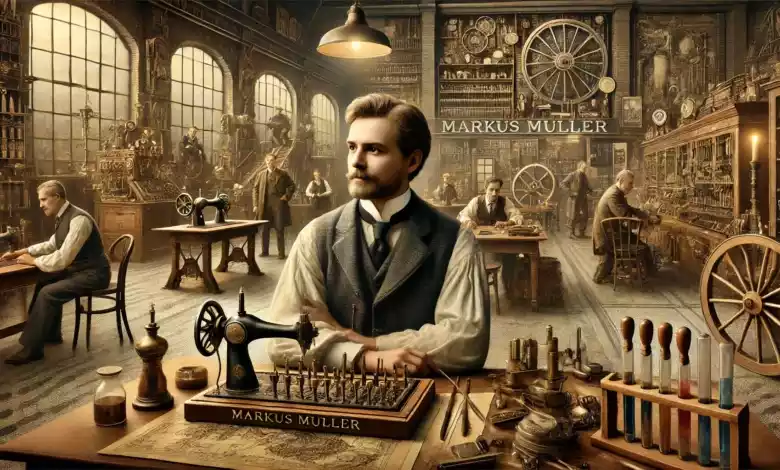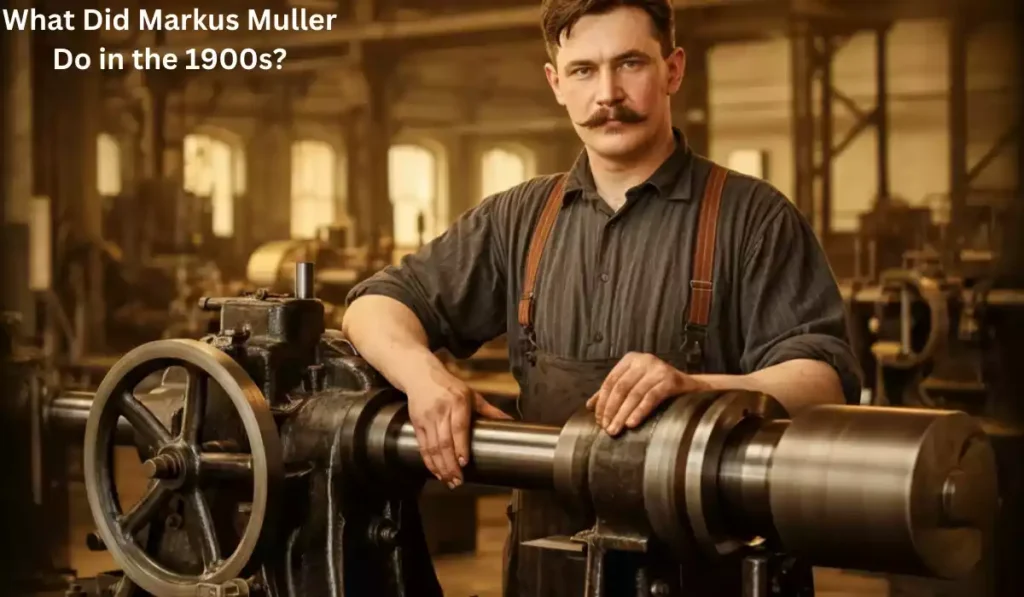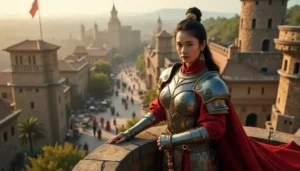The early 20th century was a time of rapidindustrialization, scientific breakthroughs, and societal transformations. Amidst this sea of change, there were countless individuals whose work influenced the direction of history in profound and lasting ways. One such individual, Markus Müller, although not widely recognized in mainstream history, made significant contributions to a variety of fields.
His endeavors helped shape the technological, agricultural, scientific, and social landscapes of the 1900s. But what did Markus Müller do in the 1900s that set him apart from his contemporaries, and why is his story often overlooked?
This article aims to explore the life and work of Markus Müller, shedding light on his crucial role in multiple transformative developments. Through an examination of his early life, his influence in engineering and agriculture, his impact on industrial growth, and his lasting legacy, we will uncover the often-overlooked contributions of a man whose innovations and vision were ahead of his time.

1. Introduction to Markus Müller: A Man Ahead of His Time
Markus Müller was born in Germany in the late 19th century, during a period when Europe was on the cusp of monumental change. His early life in a culturally rich environment fostered a deep interest in engineering and the sciences. While the world was experiencing the aftermath of the Industrial Revolution, Müller’s passion for invention and discovery positioned him as a key player in the rapid developments that defined the early 1900s. But what exactly did Markus Müller do in the 1900s that made him stand out during such a transformative era?
2. Markus Müller’s Education and Intellectual Development
Müller’s intellectual journey began at several prestigious European universities where he immersed himself in disciplines ranging from engineering to political science. What did Markus Müller do in the 1900s that enabled him to stand out in the scientific community? His academic training allowed him to approach problems from multiple angles, blending the precision of engineering with the abstract nature of physics and philosophy. His innovative approach to problem-solving helped him contribute to various sectors, from industrial manufacturing to scientific research.
He was deeply influenced by the academic environment of his time, where he crossed paths with brilliant minds who would later become famous for their groundbreaking work. Müller’s intellectual curiosity wasn’t confined to one narrow field; instead, he integrated knowledge from a variety of disciplines, which allowed him to approach the rapidly changing world of the 1900s with a unique perspective. Through this broad educational foundation, Müller was able to influence a range of industries and societal trends, making his mark in ways that others of his era could not.
3. Markus Müller’s Move to America: A Quest for Broader Impact
As the 1900s unfolded, Müller made a pivotal decision that would shape the trajectory of his career: he relocated to the United States. Why did Markus Müller decide to move to America, and what did he do upon his arrival? Driven by a desire to make a larger impact, Müller set his sights on American agriculture, a sector that was undergoing rapid transformation due to industrialization.
Upon settling in the Midwest, Müller dedicated himself to improving agricultural techniques and tools, increasing crop yields through innovative designs. By developing machinery and farming practices, he helped modernize American agriculture, enabling farmers to meet the growing demands of a rapidly expanding population. His work also introduced the concept of sustainable farming practices—an area that would gain more significance in later decades. Müller’s contributions to agriculture and his ability to translate scientific principles into practical solutions left a lasting legacy on farming methods that still benefit the industry today.
4. Innovating the Agricultural Landscape: Markus Müller’s Agricultural Revolution
One of the most profound ways in which Markus Müller impacted the 1900s was through his contributions to agricultural practices. So, what exactly did Markus Müller do in the 1900s to revolutionize agriculture? He was a pioneer in introducing scientific farming techniques that incorporated crop rotation and soil conservation principles. These methods were instrumental in improving agricultural output while ensuring the sustainability of farming practices.
Markus Müller’s focus on efficiency and productivity resulted in several key inventions that made farming more mechanized and effective. His engineering background allowed him to design advanced farming tools, which helped farmers in the U.S. increase their crop yields while reducing labor costs. Müller’s contribution to agriculture wasn’t limited to just technology; he was a strong advocate for education and knowledge-sharing, helping to spread modern farming practices to rural communities across the country.
5. Markus Müller and the Second Industrial Revolution
While Müller’s influence in agriculture is widely acknowledged, his contributions to industrial growth in the early 1900s were equally significant. What did Markus Müller do in the 1900s that contributed to the industrial boom of the period? He was deeply involved in the development of new manufacturing processes, particularly in material science. His work with alloys and machinery helped to enhance industrial production methods, making factories more efficient and output more consistent.
Müller’s innovations were crucial during the Second Industrial Revolution, a period marked by mass production, the expansion of the railroads, and the growth of large-scale industries. By introducing new techniques in metallurgy and machinery design, Müller played a key role in the development of infrastructure, including the construction of bridges and high-rise buildings. His work in material science laid the groundwork for advancements in manufacturing that would later define the 20th century.
6. Scientific Advancements: Markus Müller’s Role in Chemistry and Physics
Markus Müller’s scientific work extended beyond engineering and agriculture. What did Markus Müller do in the 1900s that advanced the fields of chemistry and physics? His research into the properties of materials led to significant discoveries in the composition and strength of alloys, which would go on to revolutionize industrial manufacturing.
Müller’s work in applied science bridged the gap between theoretical concepts and practical applications. By experimenting with materials and their properties, he helped to develop stronger, more durable metals and alloys that could withstand the pressures of industrial use. This work had far-reaching implications not only in manufacturing but also in the construction of infrastructure, military technology, and even early aviation.
7. Markus Müller and His Advocacy for Education and Social Reform
In addition to his work in industry and science, Markus Müller was an advocate for education and social reform. So, what did Markus Müller do in the 1900s to contribute to these movements? He believed in the power of education to shape a better society and worked to reform educational systems in Europe and America. Müller’s efforts included establishing organizations that promoted scientific discovery and making education more accessible to underprivileged communities.
On the social front, Müller was a vocal advocate for workers’ rights and women’s suffrage, participating in political movements that aimed to bring about social and economic reforms. His involvement in these causes helped to shift public consciousness about the importance of equality and justice, contributing to the broader social changes that characterized the early 20th century.

8. Markus Müller’s Lasting Legacy
Markus Müller’s impact on the world of the 1900s cannot be overstated. His work in agriculture, industry, and science set the stage for many of the advancements that would define the modern era. So, what did Markus Müller do in the 1900s that continues to resonate today? His inventions and innovations laid the foundation for many of the technologies we take for granted today, from the materials used in infrastructure to the methods employed in farming.
Moreover, Müller’s commitment to education and social justice has had a lasting influence on both academic and social movements. His vision of a more equitable society and a more scientifically advanced world continues to shape the way we approach both policy and innovation.
FAQ Section: What Did Markus Müller Do in the 1900s?
- Who was Markus Müller? Markus Müller was a German-born inventor, engineer, and social reformer who played a pivotal role in the industrial and agricultural advancements of the early 20th century.
- What were Markus Müller’s contributions to agriculture? Müller introduced scientific farming techniques, including crop rotation and sustainable practices, and developed machinery that revolutionized agricultural productivity.
- How did Markus Müller influence the industrial revolution? Through his work with materials science and machinery design, Müller helped improve manufacturing processes and infrastructure development during the Second Industrial Revolution.
- What role did Markus Müller play in social reform? Müller was an advocate for workers’ rights, women’s suffrage, and educational reforms, contributing to social justice movements in Europe and America.
- Why is Markus Müller important in the history of the 1900s? Markus Müller’s innovations in agriculture, industry, and science were instrumental in shaping the modern world. His work paved the way for future technological advancements and social reforms.
9. Conclusion: Markus Müller’s Enduring Influence on Modern Society
Though often overlooked in historical narratives, Markus Müller’s contributions to the fields of engineering, agriculture, science, and social reform were instrumental in shaping the 1900s. His innovations paved the way for future developments in technology and industry, while his advocacy for education and social justice helped to foster a more equitable society. By examining what Markus Müller did in the 1900s, we gain a deeper understanding of the forces that shaped the modern world and the individuals who helped to bring about these changes.
Markus Müller may not have achieved the level of fame of some of his contemporaries, but his legacy is evident in the advancements and reforms that continue to impact our world today. As we look back on the 1900s, it is important to recognize the contributions of figures like Markus Müller, whose work has left an indelible mark on history.





